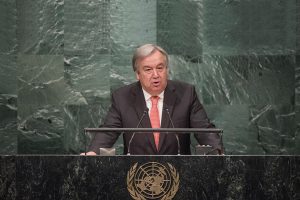The 2024 Internet Governance Forum (IGF) brought together a range of stakeholders from the private sector, the technical community, and civil society to discuss ways to: harness innovation and balance risks in the digital space; enhance the digital contribution to peace, development, and sustainability; advance human rights and inclusion in the digital age; and improve digital governance for the Internet We Want.
Convening shortly after the adoption of the Pact for the Future and Global Digital Compact in September 2024, IGF 2024 took place in Riyadh, Saudi Arabia, from 15-19 December under the overarching theme, ‘Building Our Multistakeholder Digital Future.’ It met in the lead-up to the 20-year review of the World Summit on the Information Society (WSIS+20) by the UN General Assembly (UNGA) in 2025, which will also assess the IGF’s mandate.
In his message to the Forum, UN Secretary-General António Guterres recognized the IGF as a vital platform for discussing Internet governance issues and called for collective efforts to build an open, free, and safe Internet for all.
The IGF Riyadh Messages “provide a high-level overview… of the most current thinking on key Internet governance and digital policy issues.” They reaffirm the collective vision of global stakeholders and offer insights and recommendations to guide policymaking over the coming years. The Messages cover the Forum’s four main themes.
Recognizing the potential of artificial intelligence (AI) and AI-powered solutions to play a significant role in achieving the SDGs, the Messages recommend harnessing innovation and balancing risks in the digital space by governing AI and using technology to foster inclusion and empowerment.
They call for enhancing the digital contribution to peace, development, and sustainability by promoting greener and sustainable Internet practices, making use of new technologies for peace, development, and sustainability, and protecting critical infrastructure and essential services.
The Messages recommend advancing human rights and inclusion in the digital age by enhancing meaningful connectivity and digital inclusion, sharing case studies and frameworks, protecting human rights online, and promoting digital infrastructure and e-government.
To improve digital governance for the Internet We Want, the Messages call for: improving global digital governance and coordination by transitioning the Global Digital Compact (GDC) from a vision document to an actionable framework; promoting inclusivity and bridging digital divides, addressing cybersecurity and resilience; and fostering collaboration and ethical data governance.
In his closing statement, UN Under-Secretary-General for Economic and Social Affairs Li Junhua said the Riyadh Messages “reflect the collective wisdom of this forum, distilling insights and recommendations, and will serve as a guiding light for our shared journey ahead.” [IGF 2024]


